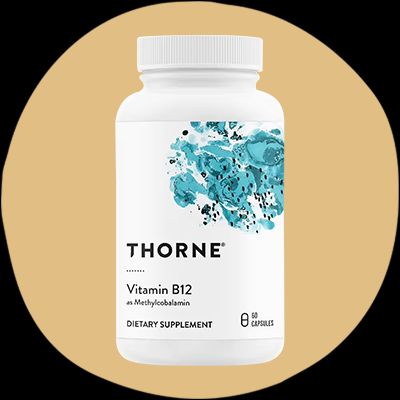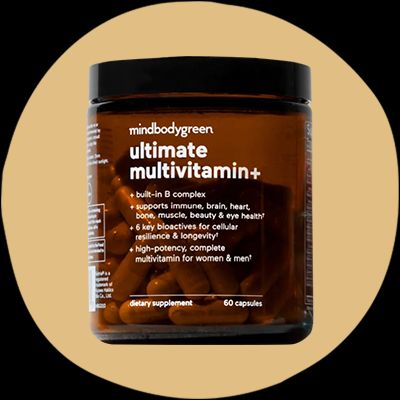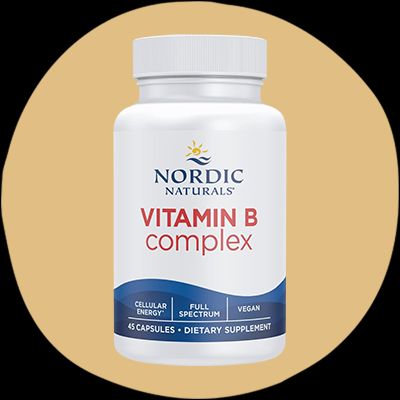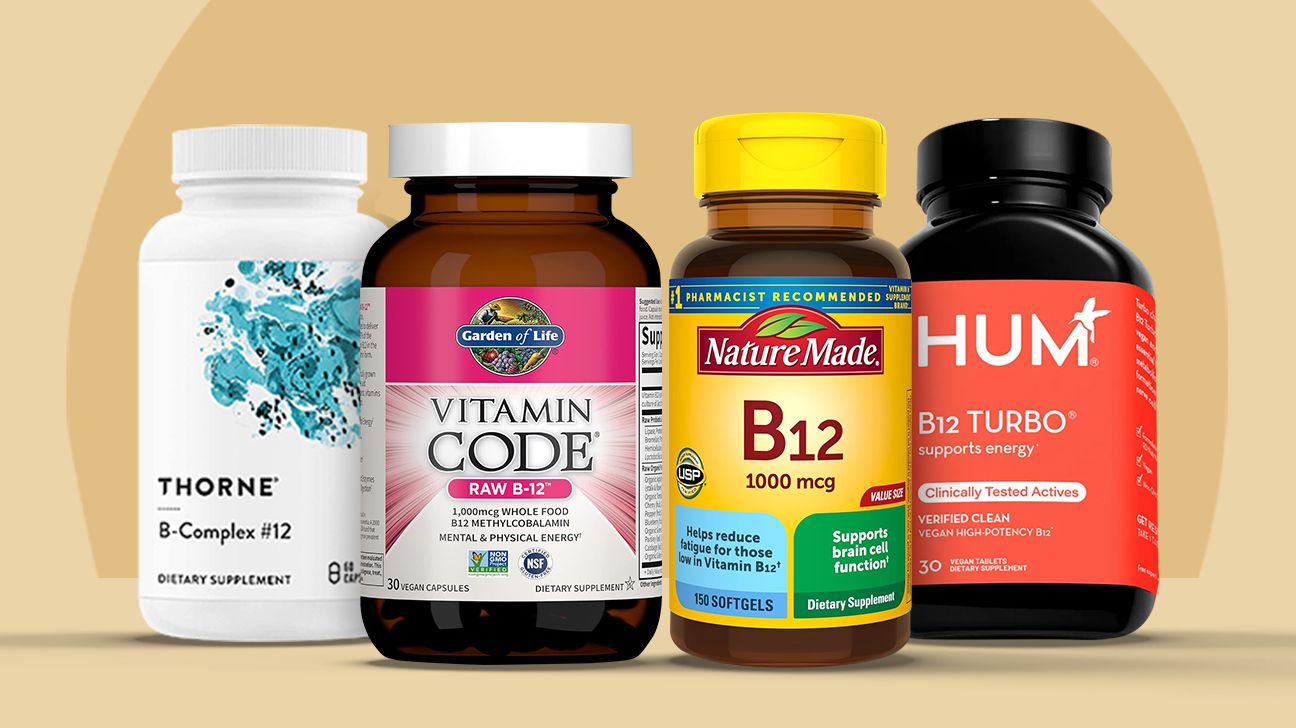We include products we think are useful for our readers. If you buy through links on this page, we may earn a small commission or other tangible benefit. Optum Store, Optum Perks, and Healthline Media are owned by RVO Health. Here’s our process.
Healthline only shows you brands and products that we stand behind.
Our team thoroughly researches and evaluates the recommendations we make on our site. To establish that the product manufacturers addressed safety and efficacy standards, we:- Evaluate ingredients and composition: Do they have the potential to cause harm?
- Fact-check all health claims: Do they align with the current body of scientific evidence?
- Assess the brand: Does it operate with integrity and adhere to industry best practices?
Thorne tops our list of best vitamin B12 supplements. Learn what other brands our dietitians recommend.
- Best overall: Thorne Vitamin B12 | Skip to review
- Best customized subscription: Care/of Vitamin B12 | Skip to review
- Best multivitamin with vitamin B12: mindbodygreen multivitamin+| Skip to review
- Best vegan: HUM B12 Turbo | Skip to review
- Best liquid: Pure Encapsulations B12 Liquid | Skip to review
- Best gummy: OLLY Daily Energy Gummy | Skip to review
- Best whole-food B12: Garden of Life Vitamin Code Raw B12 | Skip to review
- Best affordable: Nature Made B12 | Skip to review
- Best B-complex: Nordic Naturals Vitamin B Complex | Skip to review
Vitamin B12 is an essential dietary nutrient necessary for energy production and proper functioning of your nervous system, among other important roles.
It’s abundant in animal-based foods, including beef, salmon, and dairy products. Some other foods may be fortified with it.
Still, vitamin B12 deficiencies are
Serious deficiencies
Here we review the best B12 supplements on the market and discuss the importance of this nutrient, for everything from blood and nerve health to your DNA creation.
A note on price
Generally, prices for vitamin B12 range from $0.10 to $1.00 per serving, or $7 to $30 per container.
- $ = under $0.20 per serving
- $$ = $0.20–$0.75 per serving
- $$$ = over $0.75 per serving
Best overall
Thorne Vitamin B12

- Price range: $$
- Form: capsule
- Dose: 1,000 mcg
- % of the Daily Value (DV): 41,667%
Thorne is our top pick for vitamin B12 because of the company’s commitment to high quality ingredients and supplement formulations that are designed for optimal absorption.
Each 1-capsule serving provides 1,000 mcg of methylcobalamin. The supplement can be taken up to 3 times per day for individuals who need an even higher dose.
Thorne supplements are manufactured in a facility that is certified by third-party organizations such as NSF International and the Therapeutic Goods Administration (TGA), Australia’s regulatory agency responsible for evaluating the safety of supplements.
According to the company, all products are thoroughly tested, either in-house or by third-party labs, multiple times throughout manufacturing to ensure label accuracy.
Learn more about Thorne in our comprehensive review.
Pros
- manufactured in third-party certified facilities
- extensive testing to ensure purity and potency
- customizable dosing with the option to take up to 3 capsules per day
Cons
- dosing may be too high for some
Best customized subscription
Care/of Vitamin B12

- Price range: $$
- Form: capsule
- Dose: 250 mcg
- % of the Daily Value (DV): 10,417%
If you need to take multiple supplements a day, Care/of Vitamin B12 is worth considering.
Care/of is a vitamin subscription service that creates personalized supplement routines and packages your vitamins in convenient daily packs.
Care/of Vitamin B12 is vegan-friendly, non-GMO, and gluten-free.
Additionally, according to the company, all Care/of products are third-party tested for purity, heavy metals, and contaminants.
Learn more in our comprehensive review of Care/of.
Pros
- third-party tested for purity and potency
- convenient daily packs
- vegan-friendly
- gluten-free
Cons
- requires a subscription
- contains a high dose that may not be appropriate for everyone
Best multivitamin with vitamin B12
mindbodygreen multivitamin+

- Price range: $$$
- Form: capsule
- Dose: 240 mcg
- % of the DV: 10,000%
If you’re looking for a comprehensive multivitamin that’s high in vitamin B12, mindbodygreen multivitamin+ is a good option.
Each 2-capsule serving contains 10,000% of the DV for vitamin B12, along with 32 additional vitamins, minerals, antioxidants, and plant compounds.
Mindbodygreen supplements undergo rigorous testing throughout the manufacturing process at International Organization for Standardization (ISO)-certified third-party labs to ensure purity and potency.
See what our experts and testers had to say about mindbodygreen in our comprehensive review.
Pros
- third-party tested for purity and potency
- comprehensive multivitamin with high dose of vitamin B12
- vegan-friendly and gluten-free
Cons
- more expensive than others on this list
- contains a high dose of vitamin B12 that may not be appropriate for everyone
Best vegan
HUM Nutrition B12 Turbo

- Price range: $$
- Form: tablet
- Dose: 1,000 mcg
- % of the DV: 41,667%
HUM Nutrition B12 Turbo is formulated specifically with vegan diets in mind.
In addition to vitamin B12, the supplement provides a small amount of calcium, another nutrient that can be difficult to consume in adequate amounts on a plant-based diet. However, as it only provides 3% of the DV, the supplement shouldn’t be the sole source of calcium in your diet.
HUM Nutrition B12 Turbo is third-party tested, non-GMO, and free from gluten and artificial sweeteners and preservatives.
If you purchase it as part of a subscription, you’ll also have access to a registered dietitian who can provide personalized advice.
Learn more about HUM Nutrition in our expert review.
Pros
- third-party tested for purity and potency
- vegan-friendly
- gluten-free
- access to a dietitian included with subscription
Cons
- low calcium dose
- high vitamin B12 dose that may not be appropriate for some
Best liquid
Pure Encapsulations B12 Liquid

- Price range: $$
- Form: liquid
- Dose: 1,000 mcg
- % of the DV: 41,667%
If you do not enjoy taking pills, a liquid vitamin can be a better option.
Pure Encapsulations B12 Liquid is vegetarian-friendly and free from major allergens, artificial flavors and sweeteners, and hydrogenated oils.
Unflavored and lightly sweetened with stevia, you can consume it as is or mix it into any food or beverage. The company suggests taking it with a meal.
Pure Encapsulations supplements are third-party tested and produced in NSF-registered facilities.
Pros
- third-party tested for purity and potency
- produced in NSF-registered CGMP facilities
- free from major allergens
- liquid formulation that may be more tolerable for some people
Cons
- expensive compared with other options
- not vegan-friendly
- slight stevia aftertaste that some may dislike
Best gummy
OLLY Daily Energy Gummy

- Price range: $$
- Form: gummy
- Dose: 300 mcg
- % of the DV: 12,500%
OLLY Daily Energy Gummy is a highly rated B12 supplement that also contains goji berry extract and coenzyme Q10 (CoQ10).
According to reviews from
Unlike most other supplements on our list, this product contains cyanocobalamin, a synthetic form of vitamin B12 that is
OLLY Daily Energy Gummy is third-party certified by NSF and certified gluten-free. The gummies come in a Tropical Passion flavor and are sweetened with glucose syrup, beet sugar, and orange juice.
Pros
- NSF-certified
- certified gluten-free
- pleasant flavor
- gummy form that may be more tolerable for some
Cons
- limited evidence supporting the use of goji berry and CoQ10 for energy levels
- contains 2 grams of added sugar per serving
- not vegan-friendly
- features a synthetic type of vitamin B12
Best whole-foods supplement
Garden of Life Vitamin Code Raw B-12

- Price range: $$
- Form: capsule
- Dose: 1,000 mcg
- % of the DV: 41,667%
Garden of Life is a trusted brand that stands out for offering supplements made from whole-food ingredients.
In particular, its Garden of Life Vitamin Code Raw B12 is a great option for people who prefer natural ingredients. It contains vitamin B12 derived from cultures of Saccharomyces cerevisiae, a yeast that is
In addition to vitamin B12, this product contains a probiotic and enzyme blend and a fruit and vegetable blend.
While the blends are made up of whole-food ingredients, they are proprietary, which means that the brand does not disclose the amount of each ingredient. If you’re unsure about any of the ingredients or sensitive to any of them, this may not be the best product for you.
Additionally, because probiotics are not appropriate for everyone, it’s important to talk with a healthcare professional before taking this supplement.
Vitamin Code Raw B12 is certified vegan and gluten-free. It’s also third-party tested for purity and potency, though the name of the testing organization is not disclosed.
What our tester says
Healthline Manager Sydney Hanan started taking these vitamins after being diagnosed with a B12 deficiency. According to Hanan, “I received a B12 injection and was told to start taking oral supplements.
“After taking these supplements for a few weeks, I started to notice my energy levels improve. I’ve now been taking them for almost 6 months and plan to continue doing so for the foreseeable future.”
Pros
- third-party tested for purity and potency
- formulated from whole-food ingredients
- certified vegan and gluten-free
Cons
- contains proprietary blends that may not be suitable for some people
- contains a high dose of vitamin B12 that may not be appropriate for some
Best affordable
Nature Made B12 Softgels

- Price range: $
- Form: softgel
- Dose: 1,000 mcg
- % of the DV: 41,667%
Nature Made B12 Softgels are one of the most affordable options on our list. They’re also USP-verified for quality and purity.
These softgels are gluten-free and provide 10% of the DV for calcium. As the ingredients include gelatin and beeswax, the supplement isn’t suitable for people following vegan or vegetarian diets.
The company also offers an even more affordable B12 supplement, though that supplement is not USP-verified.
Pros
- USP-verified
- affordable
- easy to find
- gluten-free
Cons
- not vegan- or vegetarian-friendly
- contains a high dose that may not be appropriate for some people
- synthetic form of vitamin B12
- may not be suitable for people with kidney problems
Best allergen-free
Pure Encapsulations Methylcobalamin

- Price range: $$
- Form: capsule
- Vitamin B12 type: methylcobalamin
- Dose: 1,000 mcg
- % of the DV: 41,667%
Pure Encapsulations Methycobalamin is hypoallergenic and certified gluten-free, which means it’s a good option for people with allergies or gluten-related disorders.
It also offers a convenient one-a-day formulation, though, according to the label, you can take up to 3 capsules per day if a healthcare professional recommends a higher dose.
Pure Encapsulations products are third-party tested for purity and potency.
Pros
- third-party tested
- certified gluten-free
- hypoallergenic
- vegan-friendly
- affordable
Cons
- can become expensive if you’re taking more than 1 capsule per day
Best B complex
Nordic Naturals Vitamin B Complex

- Price range: $$
- Form: capsule
- Dose: 250 mcg
- % of the DV: 10,417%
This product from Nordic Naturals provides 250 mcg of vitamin B12 in each capsule, along with an assortment of other essential B vitamins like niacin, folate, and biotin.
Opting for a B complex supplement rather than stand-alone vitamin B12 supplement might be a better option for people with increased nutrient needs or those at an increased risk of a B vitamin deficiency.
Nordic Naturals supplements are third-party tested to ensure purity and potency, with certificates of analysis (COAs) available online.
Pros
- third-party tested for purity and potency
- COA available online
- contains a blend of B vitamins
Cons
- contains a high dose of vitamin B12, which may not be suitable for some
- some may not need a B vitamin complex
For those who dislike swallowing pills
If you are not up for swallowing pills, you might consider other forms of of vitamin B12. While we listed two options above, here are three additional supplements worth considering:
- NOW Foods Methyl B-12 lozenges: With the option to chew or let them dissolve in your mouth, these lozenges provide 41,667% of the DV for vitamin B12.
- Garden of Life mykind Organic Whole Food B-12 Spray: Each 1 mL spray contains 20,833% of the DV for vitamin B12 along with a certified organic blend of fruits, vegetables, and herbs.
- Ora Vitamin B12 Chewables: These raspberry-flavored chewables are vegan-friendly, certified organic, and provide 62,500% of the DV for vitamin B12.
| Price per serving | Daily dose | % of the DV | Third-party tested | |
|---|---|---|---|---|
| Thorne B12 | $$ | 1 capsule | 41,667% | yes |
| Care/of Vitamin B12 | $$ | 1 capsule | 10,417% | yes |
| mindbodygreen multivitamin+ | $$$ | 2 capsules | 10,000% | yes |
| HUM Nutrition B12 Turbo | $$ | 1 tablet | 41,667% | yes |
| Pure Encapsulations B12 Liquid | $$ | 1 full dropper (1 ml) | 41,667% | yes |
| OLLY Daily Energy Gummy | $$ | 2 gummies | 12,500% | yes |
| Garden of Life Vitamin Code Raw B-12 | $$ | 1 capsule | 41,667% | yes |
| Nature Made B12 Softgels | $ | 1 softgel | 41,667% | yes |
| Nordic Naturals Vitamin B Complex | $$ | 1 capsule | 33,333% | yes |
- Supplement type: We included a variety of supplement forms, such as capsules, gummies, liquids, and sprays.
- Dose: To accommodate a wide range of needs, we included products that provide varying amounts of vitamin B12. Be sure to consult a healthcare professional to find out what dose is appropriate for you.
- Testing: To ensure label accuracy, we prioritized products that are tested throughout the manufacturing process, ideally by third-party labs and organizations, like NSF International.
- Vetting: All the products on our list have been vetted to ensure they meet Healthline’s medical and business standards.
The Recommended Dietary Allowance (RDA) for vitamin B12
| Age | Males and females | Pregnancy | Breastfeeding |
|---|---|---|---|
| 1–3 years | 0.9 mcg | — | — |
| 4–8 years | 1.2 mcg | — | — |
| 9–13 years | 1.8 mcg | — | — |
| 14–18 years | 2.4 mcg | 2.6 mcg | 2.8 mcg |
| 19+ years | 2.4 mcg | 2.6 mcg | 2.8 mcg |
The recommended amount of vitamin B12 for people who have been diagnosed with a B12 deficiency or have absorption difficulties may be higher than the RDA.
Additionally, there’s currently no established upper limit for vitamin B12 due to its low risk of toxicity. In fact, because the body doesn’t store excess vitamin B12, supplementation is generally considered safe, even at large doses.
Regardless, it’s best to consult a healthcare professional before starting supplementation, especially if you’re taking other medications.
Vitamin B12 supplements can help treat or prevent a vitamin B12 deficiency, which can be serious and
Not everyone needs to take a vitamin B12 supplement, as
However, healthcare professionals may recommend vitamin B12 supplements for certain populations, including:
- people following a vegan diet
- older adults
- people who have had gastrointestinal surgery
- people who have nutrient absorption issues
- people with dietary restrictions
People taking certain long-term medications, such as metformin and proton pump inhibitors, may also benefit from a supplement, as these medications can affect absorption of vitamin B12.
However, with severe vitamin B12 deficiency or absorption issues, healthcare professionals may recommend an intramuscular injection rather than an oral supplement.
As with any supplement, it’s important to talk with a healthcare professional to determine whether a vitamin B12 supplement is necessary for you.
There are many different types of vitamin B12 available, including:
- cyanocobalamin
- methylcobalamin
- adenosylcobalamin
- hydroxycobalamin
While cyanocobalamin is the
Vitamin B12 supplements are available in a wide range of doses as well, including high dose supplements with 1,000–2,000 mcg per serving.
Research
In addition to capsules, vitamin B12 supplements are also available as liquid drops or a nasal spray.
Studies show that these forms have
If a healthcare professional has recommended that you take a vitamin B12 supplement, there are several factors to consider when shopping:
- Supplement form: Vitamin B12 supplements are available in several forms, including capsules, sprays, gummies, liquids, lozenges, and chewable tablets. Be sure to choose a form that you can tolerate taking on a daily basis.
- Cost: The price per serving can vary widely across products, so consider how the one you choose will fit into your budget.
- Quality: It’s also best to choose a product that has been third-party tested, as this ensures that it has been tested for heavy metals, contaminants, and accuracy of the label.
- Dose: Most vitamin B12 supplements contain rather high doses. Be sure to talk with a healthcare professional to determine the right dose for you.
There are several forms of vitamin B12, including cyanocobalamin, which is the most common, as well as adenosylcobalamin, methylcobalamin, and hydroxycobalamin.
While methylcobalamin may be more readily absorbed than synthetic types, research has not shown a significant difference among the various vitamin B12 types.
Additionally, there is currently no evidence that one form of vitamin B12 supplement, such as capsule or liquid, is better absorbed than another.
Though vitamin B12 is available in several different forms, research suggests that they are similar in terms of absorption and effectiveness. Various types of supplements are also available depending on your preferences, including oral capsules, nasal sprays, and liquid drops.
In terms of dosage, most adults require 2.4 mcg of vitamin B12 per day. However, this amount may be slightly higher for certain groups, including people who are pregnant or breastfeeding.
Vitamin B12 is generally considered safe, even when taken in large doses. However, it’s best to check in with a healthcare professional before taking high dose vitamin B12 supplements, especially if you’re taking other medications or have any underlying health issues.
Unlike vitamin B12 supplements, B complex supplements contain a blend of multiple B vitamins, including vitamin B12. These might be a better option for people with increased nutrient needs or those at a greater risk of deficiency, including individuals with medical conditions that affect absorption.
Vitamin B12 is primarily found in animal-based foods, including beef, salmon, yogurt, and milk, though some plant-based foods, like nutritional yeast, are fortified with it.
Vitamin B12 is an essential vitamin that’s found in several animal-based foods, including meats and many dairy products.
Certain populations, including older adults and people following a vegan diet, are at a higher risk of vitamin B12 deficiencies and may benefit from taking a vitamin B12 supplement.
When shopping for a B12 supplement, be sure to choose a product that’s appropriate for your dietary needs and preferences. It’s also helpful to select a product that is third-party tested for purity and potency.
Before starting any new supplement, be sure to consult a healthcare professional to help ensure that you’re choosing an appropriate product and dose.







